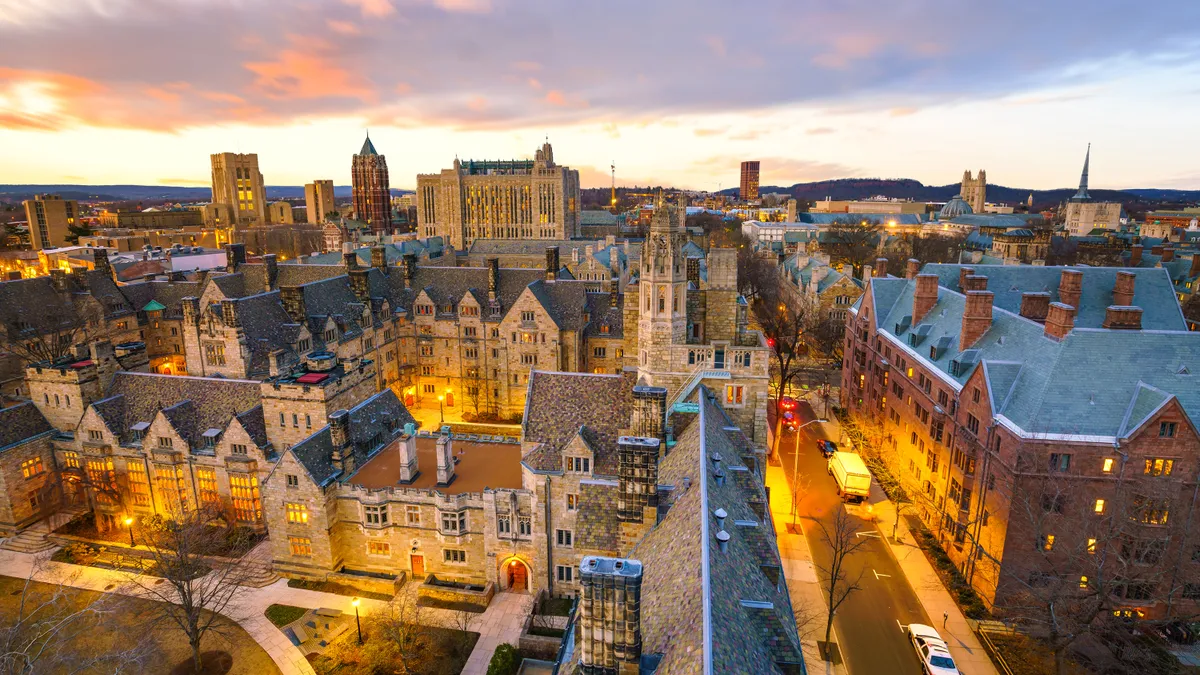Dive Brief:
- A group of former college students is suing 16 top-ranked private nonprofit universities — including Yale University, Georgetown University and the Massachusetts Institute of Technology — alleging they engaged in a price-fixing scheme that favored wealthy applicants and drove up the price of college.
- Federal law allows colleges to work together on their financial aid formulas but only if they are need-blind institutions, meaning they don't consider prospective students' ability to pay when making admissions decisions. The lawsuit, filed this week in U.S. District Court for the Northern District of Illinois, alleges that at least nine of the schools haven't been eligible for this exception because they've given a leg up to wealthy applicants in admissions decisions and therefore are not truly need-blind.
- While the lawsuit does not say whether the other seven universities are actually need-blind, it argues the exemption for need-blind institutions does not apply to them because they conspired with the other colleges. It's asking the court to give the lawsuit class-action status, make the universities liable for damages and permanently ban them from conspiring on their pricing and financial aid policies.
Dive Insight:
All 16 universities named in the lawsuit are current or former members of the 568 Presidents Group, a group formed in 1998 by more than two dozen college leaders to collaborate on a need-based financial aid system. The name references the section of federal law that allows colleges to work together on financial aid formulas.
The case is the latest shockwave to hit admissions practices at selective colleges. The recent Varsity Blues scandal, in which wealthy parents secured spots for their children through fraudulent athletic profiles and bribes to college officials, exposed how well-heeled families could manipulate admissions practices. And the U.S. Supreme Court is considering whether to take up a challenge to race-conscious admissions policies at Harvard University and the University of North Carolina at Chapel Hill.
This week's lawsuit alleges the universities are violating federal law by participating in the 568 Presidents Group because not all of their admissions systems are need blind. The other institutions named are Brown University, the California Institute of Technology, the University of Chicago, Columbia University, Cornell University, Dartmouth College, Duke University, Emory University, Northwestern University, the University of Notre Dame, the University of Pennsylvania, Rice University and Vanderbilt University.
Lawyers for the students say these institutions maintain admissions systems that favor the children of past donors or potential future donors or give priority to waitlisted applicants who will not need financial aid. It gives the example of Vanderbilt, which stated in a 2018 web post that it retains the right "to be need aware when admitting waitlisted students."
Some of the other schools engage in enrollment management, a practice which the lawsuit says uses secretive techniques that help shape cohorts of admitted students to maximize revenues and limit financial aid offers.
By working together on their financial aid formulas, these institutions have aimed to reduce competition among themselves and inflated the price of attendance for students who need financial aid, the lawsuit alleges.
The 568 Presidents Group meets at least twice a year, according to the lawsuit. One member, Yale University, temporarily withdrew its membership in 2007 because the group's policies limited how much financial aid it could offer to students, the lawyers allege. Harvard refused to join the group because of similar concerns, with one former administrator saying it was because membership would have shrunk the financial packages it could award.
In turn, the universities have overcharged more than 170,000 financial aid recipients by "at least hundreds of millions of dollars," the lawsuit says. It is seeking damages to be paid to students who enrolled in undergraduate programs during certain periods starting in 2003, received need-based financial aid from one of the institutions, but still paid tuition or room and board.
Several of the named universities defended their policies Monday.
A Caltech spokesperson declined to respond to the lawsuit's allegations but said officials were confident in the university's financial aid practices. A Yale spokesperson similarly said the university's financial aid policies are "100% compliant with applicable laws."
A Brown spokesperson said Monday afternoon that the university has not yet been served with the lawsuit but is prepared to mount an effort against the complaint. "Brown is fully committed to making admission decisions for U.S. undergraduate applicants independent of ability to pay tuition, and we meet the full demonstrated financial need of those students who matriculate," the spokesperson said in an emailed statement.
The 568 Presidents Group has many of the same members as the now-defunct Overlap Group, a collective of colleges that were accused in the early 1990s of agreeing on uniform financial aid offers for students who had been accepted by more than one of the group's member institutions. Those colleges entered a consent decree with the U.S. Department of Justice that promised not to work together to determine how much aid they offered certain students.
The new lawsuit also comes several years after the U.S. Department of Justice threatened the National Association for College Admission Counseling with continued legal action after it alleged the industry group's ethics code limited competition among colleges and could lower costs for students if removed. NACAC voted in 2019 to remove the flagged policies, heightening competition among colleges for students.
The U of Chicago, Cornell, Dartmouth, Duke, Emory, U of Pennsylvania and Rice declined to comment on the lawsuit. MIT said it is reviewing the filing and will respond in court.
Vanderbilt and the other universities named in the suit did not immediately provide a comment Monday.















